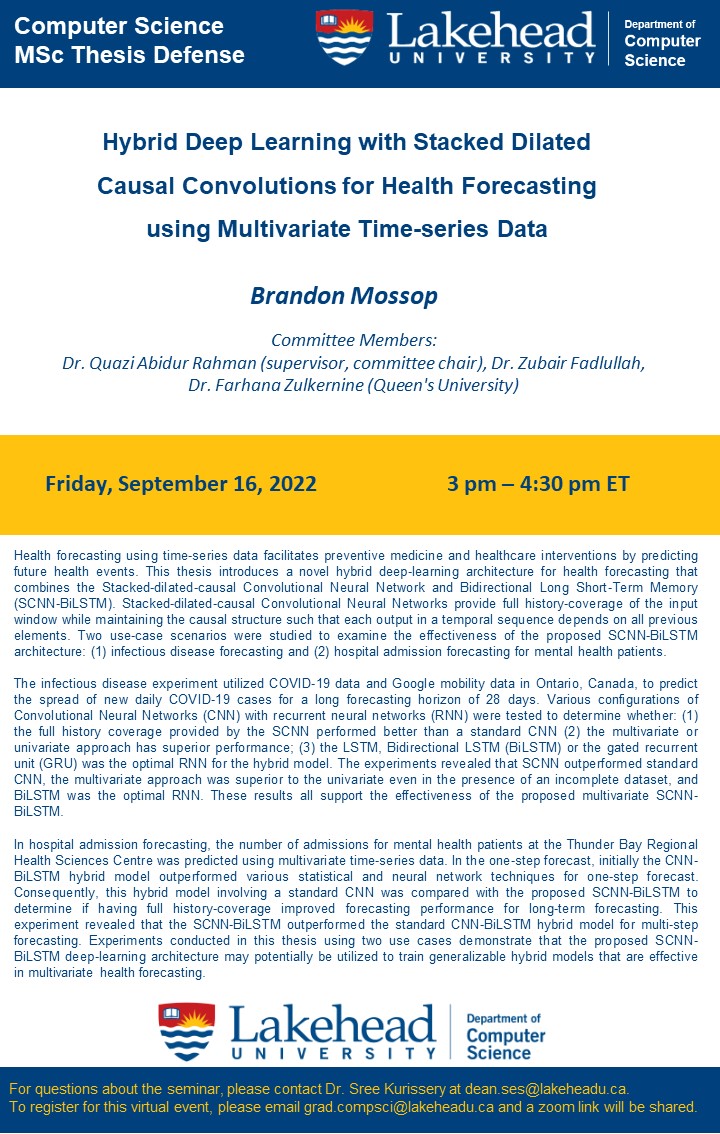Computer Science Department Thesis Defense - Brandon Mossop

Please join the Computer Science Department for the upcoming thesis defense:
Presenter: Brandon Mossop
Thesis title: Hybrid Deep Learning with Stacked Dilated Causal Convolutions for Health Forecasting using Multivariate Time-series Data
Abstract: Health forecasting using time-series data facilitates preventive medicine and healthcare interventions by predicting future health events. This thesis introduces a novel hybrid deep-learning architecture for health forecasting that combines the Stacked-dilated-causal Convolutional Neural Network and Bidirectional Long Short-Term Memory (SCNN-BiLSTM). Stacked-dilated-causal Convolutional Neural Networks provide full history-coverage of the input window while maintaining the causal structure such that each output in a temporal sequence depends on all previous elements. Two use-case scenarios were studied to examine the effectiveness of the proposed SCNN-BiLSTM architecture: (1) infectious disease forecasting and (2) hospital admission forecasting for mental health patients.
The infectious disease experiment utilized COVID-19 data and Google mobility data in Ontario, Canada, to predict the spread of new daily COVID-19 cases for a long forecasting horizon of 28 days. Various configurations of Convolutional Neural Networks (CNN) with recurrent neural networks (RNN) were tested to determine whether: (1) the full history coverage provided by the SCNN performed better than a standard CNN (2) the multivariate or univariate approach has superior performance; (3) the LSTM, Bidirectional LSTM (BiLSTM) or the gated recurrent unit (GRU) was the optimal RNN for the hybrid model. The experiments revealed that SCNN outperformed standard CNN, the multivariate approach was superior to the univariate even in the presence of an incomplete dataset, and BiLSTM was the optimal RNN. These results all support the effectiveness of the proposed multivariate SCNN-BiLSTM.
In hospital admission forecasting, the number of admissions for mental health patients at the Thunder Bay Regional Health Sciences Centre was predicted using multivariate time-series data. In the one-step forecast, initially the CNN-BiLSTM hybrid model outperformed various statistical and neural network techniques for one-step forecast. Consequently, this hybrid model involving a standard CNN was compared with the proposed SCNN-BiLSTM to determine if having full history-coverage improved forecasting performance for long-term forecasting. This experiment revealed that the SCNN-BiLSTM outperformed the standard CNN-BiLSTM hybrid model for multi-step forecasting. Experiments conducted in this thesis using two use cases demonstrate that the proposed SCNN-BiLSTM deep-learning architecture may potentially be utilized to train generalizable hybrid models that are effective in multivariate health forecasting.
Committee Members:
Dr. Quazi Abidur Rahman (supervisor, committee chair), Dr. Zubair Fadlullah, Dr. Farhana Zulkernine (Queen's University)
Please contact grad.compsci@lakeheadu.ca for the Zoom link.
Everyone is welcome.

